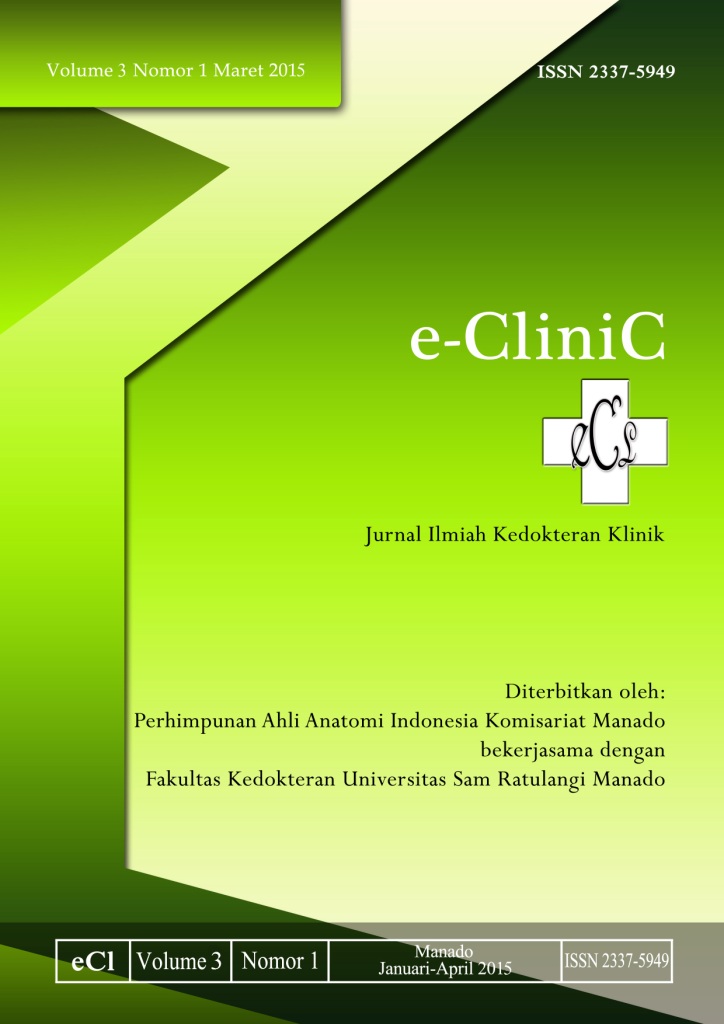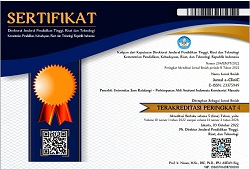FAKTOR-FAKTOR YANG MEMPENGARUHI KETERLAMBATAN PERKEMBANGAN ANAK TAMAN KANAK-KANAK
DOI:
https://doi.org/10.35790/ecl.v3i1.6752Abstract
Abstract: Development is when ability and skill increased in the structure of more complex body functions in a regular pattern and can be predicted, as a result of maturation process. This study aimed to determine the factors that influence development delay in kindergartens. Methods: This was a descriptive analytic study with cross-sectional design. The samples were 94 children who met the inclusion criterias in Kindergarten built in East Passi sub-district at Bolaang Mongondow district, October-November 2014. The development assessed using KPSP, with mark ≤ 6 counted as delayed development progress. The data was analyzed using bivariate analysis with chi square statistic test. Results: Prenatal infections, nutritional status, breastfeed, health care, parents’ income, parental education and number of siblings do not have significant relation to child development delay where the value (p = 0.05). Child with low birth weight had 2.4 folds of the risk for development delay (IC 95%: 0.9 to 0.7; p = 0.042). Residential density had 3.8 folds of the risk for development delay (IC 95%: 0.8 to 17.6; p = 0.038). Conclusion: Low birth weight and residential density are related to the delay in child development.
Keywords: development, low birth weight, residential density.
Abstrak: Perkembangan adalah bertambahnya kemampuan dan keterampilan dalam struktur fungsi tubuh yang lebih kompleks dalam pola yang teratur dan dapat diramalkan, sebagai hasil proses pematangan. Penelitian ini bertujuan untuk mengetahui faktor apa saja yang mempengaruhi keterlambatan perkembangan pada anak taman kanak-kanak. Penelitian ini merupakan penelitian deskriptif analitik dengan desain penelitian potong lintang. Sampel penelitian adalah 94 anak yang memenuhi kriteria inklusi di Taman Kanak-Kanak Kecamatan Passi Timur Kabupaten Bolaang Mongondow bulan oktober–november 2014. Perkembangan di nilai dengan menggunakan KPSP, dengan nilai ≤ 6 dikatakan keterlambatan. Analisis data dilakukan dengan analisis bivariate dengan uji statistic chi square test.Hasil penelitian memperlihatkan infeksi ibu pada masa prenatal, status gizi, pemberian ASI, perawatan kesehatan, pendapatan orangtua, pendidikan orangtua dan jumlah saudara tidak memiliki hubungan bermakna terhadap keterlambatan perkembangan anak dimana nilai (p=0,05). Berat lahir rendah berisiko 2,4 kali lipat untuk mengalami keterlambatan perkembangan (KI 95%: 0,9-0,7; p=0,042). Kepadatan hunian berisiko 3,8 kali lipat untuk mengalami keterlambatan perkembangan (KI 95% :0,8-17,6; p=0,038). Simpualn: Berat lahir rendah dan kepadatan hunian berhubungan dengan keterlambatan perkembangan anak.
Kata kunci: Perkembangan, berat lahir rendah, kepadatan hunian.
Downloads
Published
How to Cite
Issue
Section
License
COPYRIGHT
Authors who publish with this journal agree to the following terms:
Authors hold their copyright and grant this journal the privilege of first publication, with the work simultaneously licensed under a Creative Commons Attribution License that permits others to impart the work with an acknowledgment of the work's origin and initial publication by this journal.
Authors can enter into separate or additional contractual arrangements for the non-exclusive distribution of the journal's published version of the work (for example, post it to an institutional repository or publish it in a book), with an acknowledgment of its underlying publication in this journal.
Authors are permitted and encouraged to post their work online (for example, in institutional repositories or on their website) as it can lead to productive exchanges, as well as earlier and greater citation of the published work (See The Effect of Open Access).







